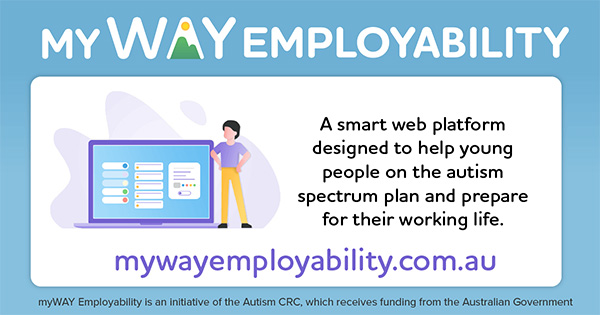myWAY Employability: Helping Autistic Young People Plan and Prepare for Their Working Life
04/04/2022
myWAY Employability is an initiative of Autism CRC, which receives funding from the Commonwealth Government. The development of myWAY Employability was proudly supported by Telstra Foundation under the Tech4Good Challenge initiative and co-led by Associate Professor Marina Ciccarelli, Curtin University and Cheryl Mangan, Autism CRC. This blog post was written with Autistic team member Ashton Bartz.

Leaving school is a time of uncertainty for most young people as they face important future life decisions. Do they want to continue studying at university or TAFE? Start an apprenticeship? Find a full-time job? Take a gap year? Or do something else entirely? For many Autistic young people, not knowing what the future holds can be downright scary for them and their families.
What is autism?
Autism is a neurodevelopmental condition that affects how your brain develops and processes information. Autistic people often think, move, and interact with the world differently than non-autistic people might expect.
Every Autistic person is different and there's no one way to be Autistic. There’s a selection of traits and experiences common for Autistic people. Still, not all Autistic people experience the same things or in the same way.
Some common traits and experiences include:
- Having a strong focus and deep interest on specific topics
- Preferring routines and doing things the same way each day
- Having a hard time understanding and communicating with non-autistic people
- Being more aware of or overwhelmed by sounds, smells, light, tastes, and touch
- Being honest and direct communicators
- Having a hard time understanding jokes and sarcasm
- ‘Stimming’ when excited or overwhelmed, which can look like flapping hands or fidgeting
The latest Australian Bureau of Statistics (ABS) figures estimate that 3.2% of children aged 5-14 years in Australia have an autism diagnosis. Additionally, Autistic people are as diverse as the rest of Australian society, and can be any age, race, gender, sexuality, faith, and/or have additional disabilities.
Supporting career planning
The most recent ABS data shows that more than a third of Autistic people are unemployed, and only a quarter graduate from university or TAFE. This suggests that most Autistic people are not given opportunities to use their diverse strengths and interests, and the world is missing out on the skills and talents of so many extraordinary individuals.
Providing Autistic young people with early support using a tailored career planning program can set them up for future success in employment. Findings from the Better OutcOmes and Successful Transitions for Autism (BOOST-A) research program identified five evidence-based Employability Principles to support transition planning:
- Start early - The ideal time to start planning for life after school is around Year 9. If that opportunity has passed, the next best time to start is right now.
- Keep the young person at the centre - Keeping the young person central to all planning and decision making for their life after school helps them develop important self-advocacy skills. It is important to stay positive and encourage the young person to be at the centre of their own career planning; in the driver’s seat; taking charge of their decisions and actions.
- Focus on the big picture – support the young person to understand what work might be like through real life experiences; for example, hobbies, work experience, volunteering, or part-time work. It is important to appreciate what work provides other than a pay cheque - knowledge and skill development, social connection, a valued place in society, and independence.
- Dream BIG - Research shows that young people are more likely to succeed when surrounded by others who believe they will do well and encourage them to aim high. Help them break big goals down into small manageable steps to achieve quick wins. Nothing fosters success like success.
- Have a champion on the team - Every young person will benefit from a champion to help them achieve their goals. This may be a parent, mentor, teacher, or friend. A champion can help provide information, opportunities, and positive reflection to support career planning and find meaningful work. Support the young person to use a ‘growth mindset’ – learning from past actions that didn’t quite work out as expected to plan for future actions. Most young people will benefit from some help to understand their strengths, interests, and work preferences, and guiding them to explore a range of careers suited to them. Play to their strengths and build from there.
Starting with myWAY Employability
Based on six years of research, myWAY Employability is a smart web platform that helps Autistic young people take control of their future. myWAY Employability has been designed with and for Autistic young people. It provides an individual profile matched to relevant careers, further education and training; and information and post-school pathways. myWAY Employability helps young people take their big dreams, create achievable smaller goals and tasks, and to track progress.
myWAY Employability also contains a variety of information articles co-produced with the Autistic community, covering topics such as Preparing for Work Experience; Getting Around; Creating a Job Application; Pathways to University, TAFE, or College; and Disclosure in the Workplace.
